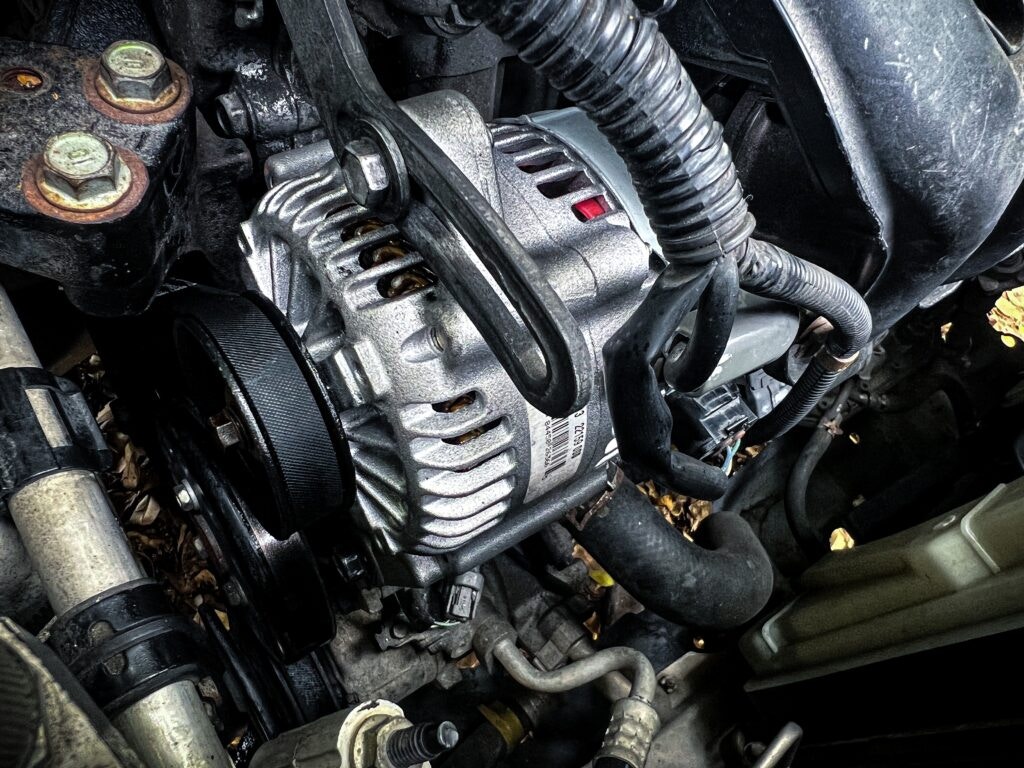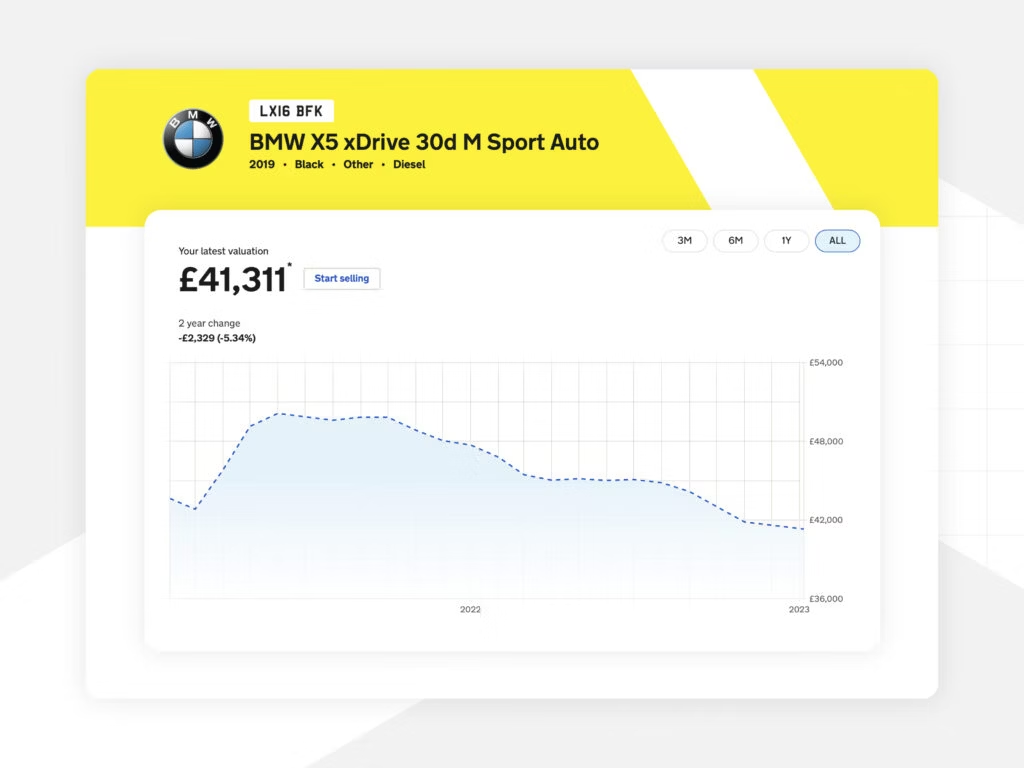How much does it cost to replace an alternator?
A pivotal component in your car’s electrical system, the alternator generates and distributes electrical power across your vehicle. Alternators convert your engine’s mechanical energy into electrical energy, literally and metaphorically keeping the lights on in your vehicle.
The alternator ensures that your vehicle has a steady power supply while running, so it’s essential to keep the component working properly.
Alternators typically last between 100,000 to 150,000 miles, but faulty parts or damage can impact functionality and cause problems with other car parts that require electricity to run. These can pose a risk to your safety, as well as impact your vehicle’s value if and when you decide to sell.
Alternators can be expensive to repair or replace, from £100 to £800+. From parts to labour, read on for a comprehensive explanation of factors impacting alternator replacements here in the UK.
- What is an alternator?
- Common faulty alternator signs
- How much does a damaged alternator affect my car’s value?
- Replacement cost factors
- FAQs
What is an alternator?

Your alternator performs four main roles within your car’s electrical system:
1. Energy converter – The alternator converts the engine’s power into electrical energy, fuelling your car’s electrical components, including headlights, air conditioning, and power windows.
2. Electrical distribution – The alternator ensures the flow of electricity across your vehicle, providing a consistent electrical supply for essential components, without draining your car’s battery.
3. Battery support – The alternator helps properly charge your car battery, preventing power depletion, overcharging, and potential breakdowns.
- Voltage control – Along with the battery and voltage regulator, the alternator regulates your car’s voltage levels, safeguarding sensitive electronic components from damage.
Alternators have a finite lifespan of between 100,000 to 150,000 miles, or approximately 8 to 12 years. However, numerous factors influence the health and longevity of your alternator, including:
- Driving conditions – Frequent short trips or stop-start traffic can strain the alternator, potentially shortening its lifespan.
- Battery health – Is your car battery in top shape? A healthy and well-maintained battery contributes to the overall efficiency of the alternator, impacting its longevity.
- Electrical load – Constantly running high electrical loads, such as aftermarket accessories, can accelerate wear on the alternator.
- Belt tension – Proper tension in the alternator belt is crucial; excessive slack or tightness can lead to premature wear.
- Alternator parts quality – The quality of alternator components and replacement parts can significantly influence its overall lifespan.

Alternator and electrical system parts
Your car’s electrical system consists of many complex parts. We distinguish the key pieces impacting your alternator’s function below.
| Part | Description |
| Alternator unit | Core component, price varies based on brand, type, and vehicle compatibility. |
| Drive belt | Recommended for replacement during alternator changes for optimal performance. |
| Tensioner pulley | Maintains proper belt tension, crucial for alternator functionality. |
| Bolts and fasteners | Secures the alternator in place, costs depend on the specific vehicle model. |
| Electrical connectors | Essential for proper electrical connection, ensuring seamless integration. |
| Voltage regulator | Controls alternator output, influencing charging system efficiency. |
| Wiring harness | Connects alternator to the vehicle’s electrical system, replacement costs vary. |
Common faulty alternator signs
❌ Battery warning light – The battery warning light on your dashboard turns on.
❌ Dimming lights – Headlights, dashboard lights, or interior lights flicker or appear noticeably dim, especially when idling or driving at low speeds.
❌ Strange noises – Unusual whining or grinding noises can suggest a failing alternator belt or component failure.
❌ Weak or dead battery – frequent battery issues or a sudden inability to start the vehicle can be caused by a broken alternator.
❌ Burning smell – Do you smell burning rubber? This can be a key indicator of a slipping alternator belt.
❌ Electrical failures – Malfunctions in various electrical components, such as power windows or seat adjustments.
❌ Stalling or difficulty starting – Engine stalling or experiencing difficulty starting, especially after a jump-start.
How much does a damaged alternator affect my car’s value?
A faulty alternator can pose a risk to your car’s entire electrical system, affecting the overall value of your vehicle and causing it to depreciate quicker.
When assessing a car’s value, buyers consider the condition and functionality of all the key components, including the alternator. A damaged alternator could signal potential issues with the entire electrical system, affecting the car’s reliability and performance.

Overall, any damage or malfunction that affects a car’s essential systems can influence its value, although the extent of depreciation to your car’s value varies depending on the state of the damage. For a relatively new car with low mileage, a minor alternator issue that’s easily fixable could result in an approximate 5% depreciation in value. Buyers might negotiate a slightly lower price to accommodate the repair cost.
If your alternator problem is more significant and potentially affecting other electrical components, it could lead to a reduction of around 10% to 15% in the car’s value.
Severe damage or irreparable alternator issues can lead to other vehicle system failures. The overall impact on your car’s valuation may be even higher, ranging from 20% to 30% or more, depending on the specific circumstances.
For older cars or those with higher mileage, a damaged alternator’s impact on value might be less noticeable as wear-and-tear is expected with age. Damage in these vehicles could result in a 5% to 15% devaluation.
Remember, these estimates are generalisations and the actual impact can vary based on the specific make, model, year, and condition of the car, as well as the prevailing market conditions. However, remember that a faulty alternator most likely will lower your vehicle’s overall value if and when you choose to sell.
Replacement cost factors
Replacing your alternator can leave a dent in your wallet. While the part is often one of the most expensive components to replace, costs vary greatly. Depending on your vehicle’s needs, choice of new parts, and the other car-specific factors detailed below, you could be looking at a bill between £100 and £800+.
Replacement parts
Before replacing your alternator, it’s important to assess both your vehicle’s overall electrical demands and your budget. Standard Original Equipment Manufacturer (OEM) alternators usually run between £100 to £200, making them the most affordable option.
Upgrading to a higher AMP alternator may be necessary for those with extensive aftermarket accessories, power-hungry modifications, or specialised requirements. While AMP alternators offer enhanced electrical capacity, their upfront cost tends to be higher, usually from £200 to £500.
If you’re looking to greatly increase performance, consider performance or specialty alternators. However, these parts usually cost between £300 and £800.
Consult a professional mechanic for what’s best for your car.
Cable gauge and fuse considerations
Upgrading to a high AMP or performance alternator necessitates attention to supporting components like cables and fuses.
An adequate cable gauge is crucial to handle increased electrical current, while appropriate fuses safeguard your vehicle’s electrical system. Keep both factors in mind while replacing your alternator.
Stop/start system components
The integration of stop/start systems in modern vehicles also affects alternator costs. Designed for fuel efficiency, many modern stop/start systems require alternators with specific features, potentially adding to your overall replacement costs.
Installation costs
Replacing an alternator is a sizable task that should be undertaken by a professional. Where you get your alternator replaced can drive up (or down) your bill.
Labour rates for alternator replacement vary among garages and dealerships in the UK. Independent garages usually charge £50 to £100 per hour, while franchise dealerships come in at £80 to £150 per hour. If you go to a specialist auto repair shop, your installation fee is likely to fall between £60 to £120 per hour.
The average labour time for an alternator repair ranges from 1 to 2 hours, but specific factors like the vehicle model and accessibility can influence this timeframe. Always consult with your mechanic for an accurate repair timeline for your vehicle.

FAQs
Is it worth replacing an alternator?
Yes, replacing a faulty alternator is worthwhile to ensure a reliable and well-functioning electrical system in your car.
Is changing a car alternator a big job?
Replacing your car’s alternator requires skill. Consult a professional mechanic or garage for best results.
Can I still drive if the alternator is bad?
It’s not recommended to drive with a faulty alternator. Malfunctioning alternators can drain your car battery, causing your vehicle to stall.
How long can a car run without an alternator?
Your car only can run for a short amount of time without an alternator. The battery will power the car for a limited time before dying, causing the starter motor and car engine to stop entirely. This will leave you and your vehicle stranded.
How can I track the value of my car?

A faulty alternator can impact the value of your vehicle. But what if you don’t know what your car’s value is to begin with?
While car values depreciate over time, the rate at which your value changes varies from car to car. To get a free and reliable monthly price alert – on up to six vehicles at once! – use Motorway’s Car Value Tracker.
With the Car Value Tracker, you can follow your vehicle’s worth as it changes over time, helping you make informed choices about investments in your car’s maintenance and choose the best time to sell.
Need to sell your car?
Want to learn more about owning, maintaining, and selling your car? Check out more of our guides here, covering everything from Clean Air Zones to car tax, and plate changes to part exchange.
- Sell my car
- Track your car value
- What are the most expensive parts of a car to replace?
- Car anatomy: what are the parts of a car?
- How much does it cost to replace a gearbox?
- How much does it cost to replace a car engine?
- How much does it cost to replace a car suspension?
- How much does it cost to replace brake pads?
- How much does it cost to replace a windscreen?
- How much does it cost to replace a head gasket?
- How much does it cost to replace a cambelt?
- How much does it cost to replace a car battery?
- How much does it cost to replace a car door?
- How much does it cost to replace a car radiator?
- How much does it cost to replace a clutch?
- How much does it cost to replace an exhaust system?
The information provided on this page is for general informational purposes only and should not be considered as professional advice.